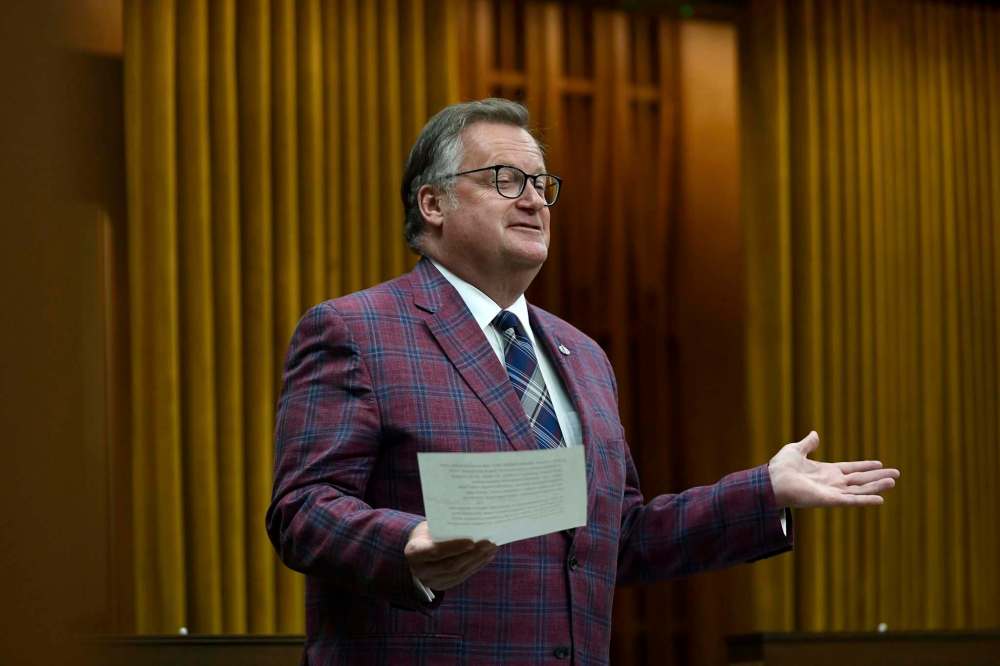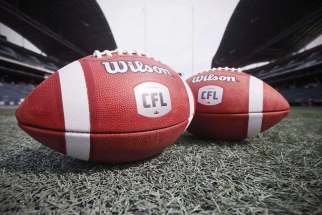Politicians talk, CFL sweats With time running out, negotiations continue over financial aid to save season
Read this article for free:
or
Already have an account? Log in here »
To continue reading, please subscribe:
Monthly Digital Subscription
$0 for the first 4 weeks*
- Enjoy unlimited reading on winnipegfreepress.com
- Read the E-Edition, our digital replica newspaper
- Access News Break, our award-winning app
- Play interactive puzzles
*No charge for 4 weeks then price increases to the regular rate of $19.00 plus GST every four weeks. Offer available to new and qualified returning subscribers only. Cancel any time.
Monthly Digital Subscription
$4.75/week*
- Enjoy unlimited reading on winnipegfreepress.com
- Read the E-Edition, our digital replica newspaper
- Access News Break, our award-winning app
- Play interactive puzzles
*Billed as $19 plus GST every four weeks. Cancel any time.
To continue reading, please subscribe:
Add Free Press access to your Brandon Sun subscription for only an additional
$1 for the first 4 weeks*
*Your next subscription payment will increase by $1.00 and you will be charged $16.99 plus GST for four weeks. After four weeks, your payment will increase to $23.99 plus GST every four weeks.
Read unlimited articles for free today:
or
Already have an account? Log in here »
Hey there, time traveller!
This article was published 22/07/2020 (1972 days ago), so information in it may no longer be current.
On the day after Winnipeg was tentatively named the hub city for a possible 2020 CFL season, the federal government made it clear it will not be writing the league a cheque to assist with that.
MPs convened in the House of Commons on Wednesday and Minister of Canadian Heritage Steven Guilbeault was asked by Conservative MP Kevin Waugh (Saskatoon-Grasswood) if the government would be granting the CFL its request for $42.5 million in financial aid to help play a shortened campaign this year.
“We understand that for many Canadians, professional sport is a facet of their daily lives, and we certainly respect that,” answered Guilbeault.

“Through Sport Canada our government funds amateur and youth programs across the country. Sport Canada does not provide funding to for-profit independent leagues or goes outside of Football Canada’s mandate. We encourage organizations in need of assistance to talk to their financial institution and to see what options are available to them.”
Waugh responded with: “So I take it then, the answer would be no to the Canadian Football League?”
The discussion then carried over to Twitter, where Guilbeault would finally answer Waugh’s question. This time, though, he seemed to change his tune.
“That would be wrong since we are in fact in discussion with the CFL,” he wrote.
Waugh replied minutes later: “You said in the chamber that the government does not provide funding to for-profit leagues and that they should talk to their own financial institution to see what options are available to them.”
Guilbeault didn’t provide clarification on what he was referring to when he suggested the CFL “talk to their own financial institution,” though it’s possible he could have been hinting at a reported link between the league and the Business Development Bank of Canada (BDC).
It was reported earlier this week that the CFL’s most recent proposal to the government was being handled by the BDC, in the form of a low-interest loan. The BDC is a federal agency but its also a Crown corporation, meaning the feds couldn’t approve CFL receiving financial assistance from BDC.
Given the financial state of the CFL — commissioner Randy Ambrosie, in May, said the league loses between $10 million and $20 million each year, including $20 million in 2019 — it’s unlikely the league would qualify for a loan. That is, unless the Quebec, Ontario, Manitoba, Saskatchewan, Alberta and B.C. governments serve as guarantors on any funding provided.

The chances of that happening seem low, considering Ontario Sport Minister Lisa MacLeod’s stance on the matter.
“We’re all trying to see how we can support (the CFL),” MacLeod said in an interview several weeks ago. “That said, my mandate is very clear in supporting amateur and minor sports, it’s not to fund professional sports so any conversation with regards to that I’d have to look at it.”
Either way, the CFL is running out of options and time.
The league set a self-imposed deadline of today to reach an agreement with the CFL Player’s Union on a new collective bargaining agreement for this year and in 2021. That includes a return-to-play plan for 2020, a season that would most likely include a six-game regular season for each team and an eight-team playoff format. Both the CFL and CFLPA would have to approve any new deal.
The CFL hopes to still obtain some sort of funding by the proposed deadline, which might be moved one day ahead to Friday, according to sources.
Hence, the fate of the 2020 season may very well be decided in the next 24 to 48 hours.
On Tuesday, Winnipeg Football Club president and CEO Wade Miller said meeting the proposed deadline is crucial to having a shortened season in Winnipeg.
“That’s what everyone is working towards. There’s a lot that goes into making this happen so we’re all working towards that and we’ll find a way to get there,” he said.

“It’s an extremely important date because you start to wind things back of when you need to bring players in, when they need to start isolating, when you need to confirm hotels — there’s a lot of moving parts to this. There’s a lot of work that needs to be undertaken, which has started and will continue now that we’re full-steam ahead in Winnipeg.”
The CFL initially asked the federal government for up to $150 million in assistance in April, in the event the league would be forced to cancel the 2020 season owing to the COVID-19 pandemic. That bid was changed earlier this month, when the CFL reached out to the government for help, this time with a revised proposal for approximately $42.5 million. The league plans to use the money to cover player salaries and operating costs.
The Free Press reached out to the Winnipeg Blue Bombers, CFL and the CFLPA for comment on Wednesday and all three declined.
taylor.allen@freepress.mb.ca
jeff.hamilton@freepress.mb.ca

Eighteen years old and still in high school, Taylor got his start with the Free Press on June 1, 2011. Well, sort of...

Jeff Hamilton
Multimedia producer
After a slew of injuries playing hockey that included breaks to the wrist, arm, and collar bone; a tear of the medial collateral ligament in both knees; as well as a collapsed lung, Jeff figured it was a good idea to take his interest in sports off the ice and in to the classroom.
Our newsroom depends on a growing audience of readers to power our journalism. If you are not a paid reader, please consider becoming a subscriber.
Our newsroom depends on its audience of readers to power our journalism. Thank you for your support.










